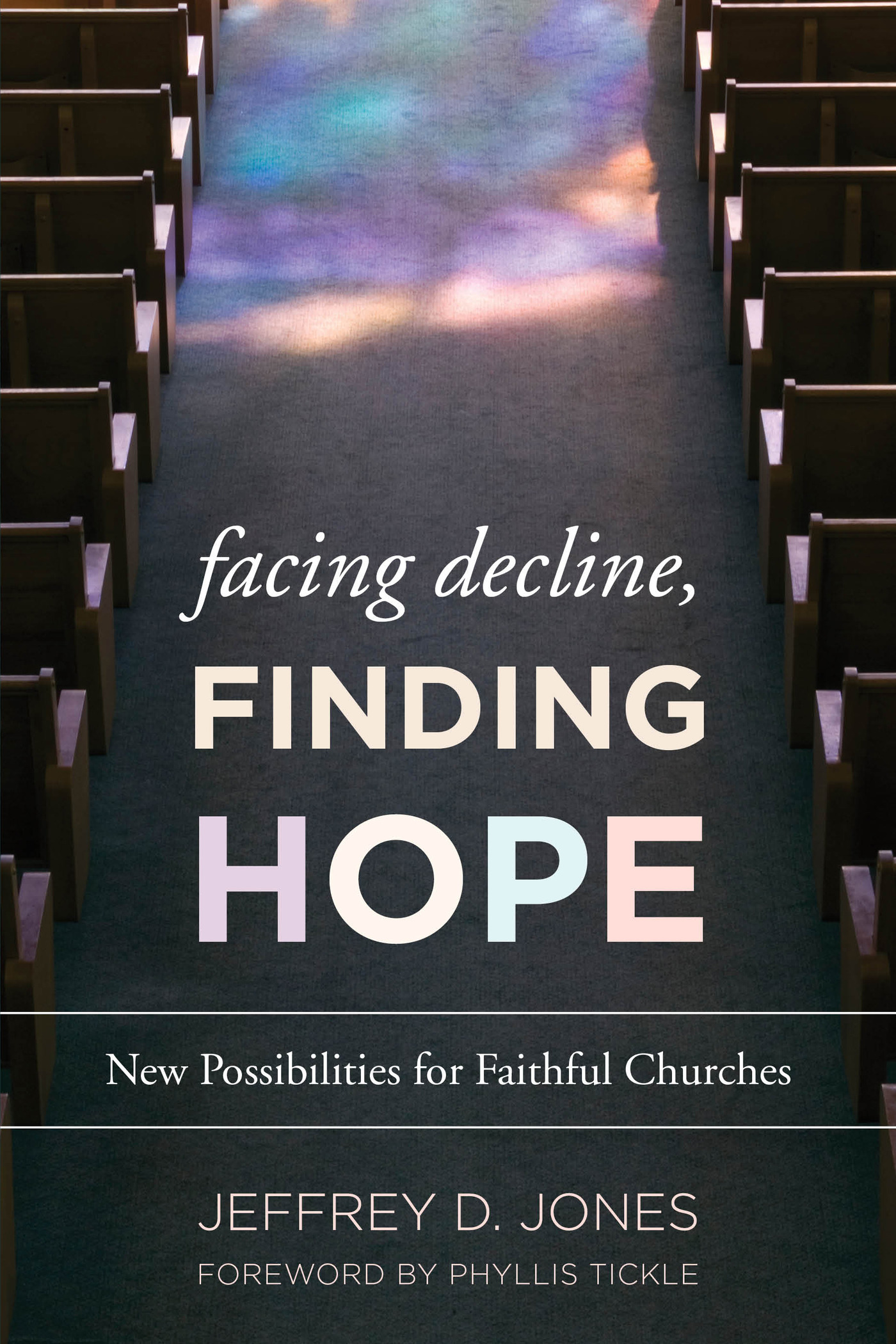Praise for Facing Decline, Finding Hope
Jones has courageously identified the challenge before the overwhelming majority of churches in North America. As painful as his analysis is, it remains rooted in the hope that comes from God alone. Brave Christians will read and pray! Dwight Stinnett, executive minister, American Baptist Churches of the Great Rivers Region
Fifty years ago it didnt occur to anyone that most people would have better things to do than go to church. Church (as we knew it) had intrinsic value, but no longer. The first step is admitting we have a problem. If there are twelve steps, Jones has been through them all, and sober for a long time. In Facing Decline, Finding Hope, Jones gives us a big book for churches in recovery which is bound to be required reading for all seminarians. Sean Witty, senior minister, First Baptist Church, Newton Centre, Massachusetts
This is a deep and insightful book on the realities faced by every church trying to stay relevant, healthy, and vital in todays ever-changing world. The response may be too simple for most of uslet go and let God lead on to a new future! How do we really do that? Jones suggests new questions that help in radically rethinking what it means to be church in a different world. Mayra Castaeda, senior minister, First Baptist Church of Westfield
Even with the decline that is facing mainline Protestantism, thousands of clergy still serve thousands of churches, and theyre trying to make a difference. Based on his many years as a pastor, professor, and denominational executive, Jones brings a clear-eyed vision of how congregations can thrive and flourish, even in tough times. This book will indeed do what it promises: bring hope. Tony Jones, author of The Church is Flat
Facing Decline,
Finding Hope
Facing Decline,
Finding Hope
New Possibilities for
Faithful Churches
Jeffrey D. Jones
Foreword by Phyllis Tickle

An Alban Institute Book
ROWMAN & LITTLEFIELD
Lanham Boulder New York London

Published by Rowman & Littlefield
A wholly owned subsidiary of The Rowman & Littlefield Publishing Group, Inc.
4501 Forbes Boulevard, Suite 200, Lanham, Maryland 20706
www.rowman.com
Unit A, Whitacre Mews, 26-34 Stannary Street, London SE11 4AB
Copyright 2015 by Jeffrey D. Jones
All rights reserved. No part of this book may be reproduced in any form or by any electronic or mechanical means, including information storage and retrieval systems, without written permission from the publisher, except by a reviewer who may quote passages in a review.
British Library Cataloguing in Publication Information Available
Library of Congress Cataloging-in-Publication Data
Jones, Jeffrey D.
Facing decline, finding hope : new possibilities for faithful churches / Jeffrey D. Jones.
pages cm
An Alban Institute book.
Includes bibliographical references.
ISBN 978-1-56699-772-0 (cloth : alk. paper)ISBN 978-1-56699-732-4 (pbk. : alk. paper)ISBN 978-1-56699-733-1 (electronic)
1. Church attendance. 2. Church growth. 3. Church renewal. 4. Pastoral theology. 5. Church work. I. Title.
BV652.5.J66 2015
254'.5dc23
2014042142
 TM The paper used in this publication meets the minimum requirements of American National Standard for Information Sciences Permanence of Paper for Printed Library Materials, ANSI/NISO Z39.48-1992.
TM The paper used in this publication meets the minimum requirements of American National Standard for Information Sciences Permanence of Paper for Printed Library Materials, ANSI/NISO Z39.48-1992.
Printed in the United States of America
To David Fredrickson, Sam Tucker, Sarah Drummond, and Peter Gomes, cherished friends and colleagues of the past decade, whose lively spirits and deep faith have
enlivened my spirit and deepened my faith.
Foreword
Hope is almost always seen as a good and desirable thing. It is that, of course, but sometimes the hope we seek for... the hope we desperately want and thirst for, in fact... is hidden from us by our own anguish. We are so deeply distressed in body or spirit that, like the Children of Israel overcome by serpents in the desert, we cannot look up from our agony, even when we know that by doing so we would relieve it.
Sometimes, of course, hope is obscured by the sheer franticness of our search for it. Paradoxically, our own despairing analysis of what is so desperately wrong effectively distracts us from the balm that we seek.
And sometimes it is simply fear itself that keeps us from embracing the hope we yearn for, because sometimes, to embrace the thing that will heal us means first the recasting... or perhaps even the casting off... of what we are and of how we have been. Yet, as our own Scriptures teach us, without hope, the people perish.
It is in full awareness of all these things and of the imperative patent in them that Jeffrey Jones has written the words that follow here, and it is in full awareness of all these things and of the imperative patent in them that we must read his words. A seasoned pastor and, for several years now, a seminary professor, he both knows the rhythms and contours of our contemporary lives as Christians and as Church, while also having the kind of informed impunity that allows him to challenge us into looking honestly at those contours. His is a remarkable circumstance, and this is a remarkable book.
There is no question about the fact that institutional Christianity as we have known and practiced it over the five hundred years since the Reformation is no longer consonant with the mores and norms, assumptions, means, and perceptions of the times and circumstances in which we now live. The world in which we are citizen-dwellers drives us to seek a structure and practice of faith that is less hierarchal and more communal than is that which the Reformation and the centuries since bequeathed us. It presents us with questions whose intellectual and factual undergirding was unknownand therefore unavailableto our religious forebears. It finds institutions themselves suspect... and most particularly religious ones... and does not hesitate to challenge them, even to their demise. It is suspicious of the professional expert and seeks instead the democratization of roles in both sacred and secular life. It assumes an easy and unfettered access both to information and to our fellow human beings. It seeks spiritual reality and presupposes open intercourse with it. And as Jones shows us in his radical, but instructive commentary on the work of Ezra and Nehemiah, it yearns, as have other times of holy upheaval, for prophets more than it does for priests. There is a bravery required just to acknowledge these changes. And certainly, even more than that, enormous bravery is required to address them. But bravery alone is not enough; for bravery, uninformed, can all too easily become foolhardy or pointlessly destructive. As you read the pages that follow, then, you indeed will find bravery in Joness addressing of the issues of Church today, but you will find something else as wellsomething much more valuable and many, many times more useful. You will find an honesty of presentation about what is and an integrity of forecasting about what can (and must) be. Beyond those things, you will find as well suggestions for arriving at that state of religious health and spiritual well-being that is our hope. You will, in other words, find a most hope-filled wisdom.

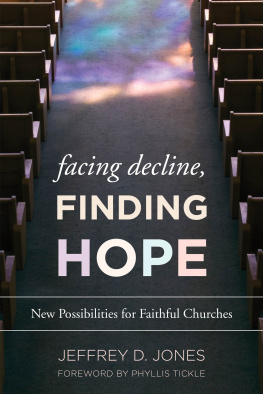
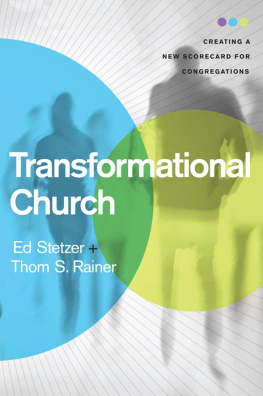
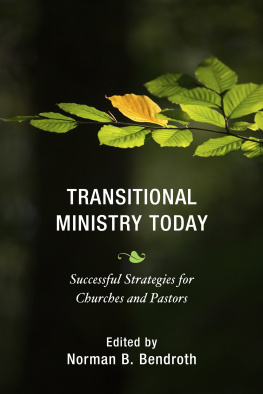
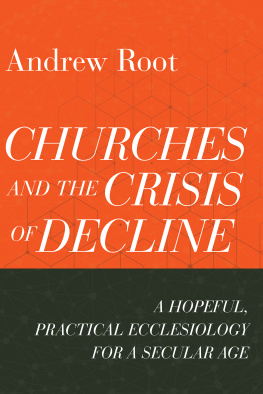
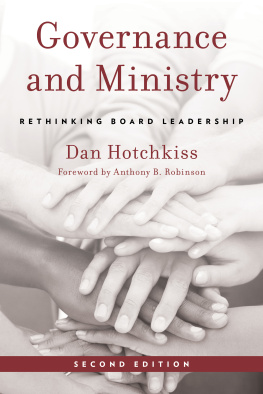

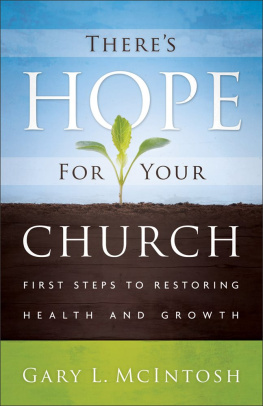



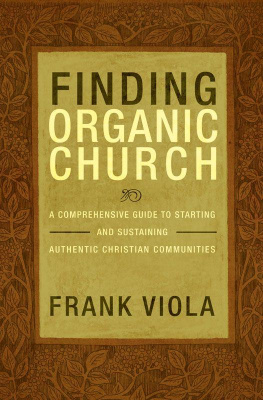


 TM The paper used in this publication meets the minimum requirements of American National Standard for Information Sciences Permanence of Paper for Printed Library Materials, ANSI/NISO Z39.48-1992.
TM The paper used in this publication meets the minimum requirements of American National Standard for Information Sciences Permanence of Paper for Printed Library Materials, ANSI/NISO Z39.48-1992.